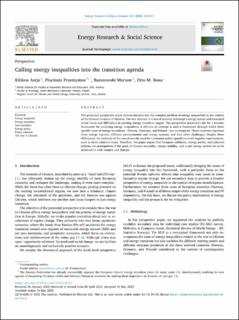Calling energy inequalities into the transition agenda
| dc.contributor.author | Klitkou, Antje | |
| dc.contributor.author | Przemysław, Pluciński | |
| dc.contributor.author | Mariusz, Baranowski | |
| dc.date.accessioned | 2023-05-23T07:42:28Z | |
| dc.date.available | 2023-05-23T07:42:28Z | |
| dc.date.created | 2023-05-22T13:34:08Z | |
| dc.date.issued | 2023 | |
| dc.identifier.issn | 2214-6296 | |
| dc.identifier.uri | https://hdl.handle.net/11250/3068600 | |
| dc.description.abstract | The presented perspective paper delivers insights into the complex problem of energy inequalities in the context of the Russian invasion of Ukraine. The war resulted in a loss of stability in Europe's energy system and increased social issues and difficulties in meeting energy transition targets. The perspective presented calls for a broader framework for analyzing energy inequalities. It delivers an attempt at such a framework through which three specific cases of energy transitions—Norway, Germany, and Poland—are investigated. These countries represent three energy regimes, different socioeconomic and energy systems, and face other challenges. Despite these differences, the outbreak of the war shows the need for a common policy agenda to avoid negative repercussions, such as social cohesion crises. Therefore, this paper argues that European solidarity, energy justice, and coherent policies are prerequisites if the goals of climate neutrality, energy stability, and a just energy system are to be achieved in each country and Europe. | en_US |
| dc.language.iso | eng | en_US |
| dc.title | Calling energy inequalities into the transition agenda | en_US |
| dc.title.alternative | Calling energy inequalities into the transition agenda | en_US |
| dc.type | Peer reviewed | en_US |
| dc.type | Journal article | en_US |
| dc.description.version | publishedVersion | en_US |
| dc.source.journal | Energy Research & Social Science | en_US |
| dc.identifier.doi | 10.1016/j.erss.2023.103144 | |
| dc.identifier.cristin | 2148501 | |
| cristin.ispublished | true | |
| cristin.fulltext | original | |
| cristin.qualitycode | 1 |
Tilhørende fil(er)
Denne innførselen finnes i følgende samling(er)
-
4 - Academic Publications / Vitenskapelige publikasjoner [325]
Academic Articles and Book Chapters -
Publikasjoner fra Cristin [357]
